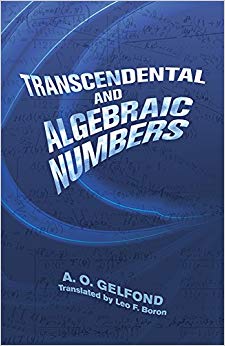Background
Alexander Gelfond was born on October 24, 1906, in Saint Petersburg, Russian Empire in the family of a professional physician and amateur philosopher Osip Gelfond.
1 Lenin Mountains str., Moscow 119991, Russia
From 1924 to 1927 Alexander studied in the division of mathematics of the department of physics and mathematics at Moscow State University. Later he took a postgraduate course under A. J. Khintchine and V. V. Stepanov.
Russian Federation
Alexander Gelfond
Alexander Gelfond and Louis Joel Mordell
Russian Federation
Alexander Gelfond
Russian Federation
Alexander Gelfond
Russian Federation
Alexander Gelfond with his wife
Russian Federation
Alexander Gelfond
Russian Federation
Alexander Gelfond















(Primarily an advanced study of the modern theory of trans...)
Primarily an advanced study of the modern theory of transcendental and algebraic numbers, this treatment by a distinguished Soviet mathematician focuses on the theory's fundamental methods.
https://www.amazon.com/Transcendental-Algebraic-Numbers-Dover-Mathematics/dp/0486495264
1960
educator mathematician scientist
Alexander Gelfond was born on October 24, 1906, in Saint Petersburg, Russian Empire in the family of a professional physician and amateur philosopher Osip Gelfond.
From 1924 to 1927 Alexander studied in the division of mathematics of the department of physics and mathematics at Moscow State University. Later he took a postgraduate course under A. J. Khintchine and V. V. Stepanov.
In 1929-1930 Gelfond taught mathematics at Moscow Technological College, and from 1931 until his death he was at Moscow University, where for a number of years he held the chair of analysis. He later held the chair of the theory of numbers, to which was subsequently added the history of mathematics. From 1933 he also worked in the Steklov Institute of Mathematics. He became professor of mathematics in 1931 and doctor of mathematics and physics in 1935.
In 1748 Euler had expressed the idea that logarithms of rational numbers with rational bases are either rational or transcendental. Generalizing that statement, among the famous twenty-three problems that Hilbert posed in 1900, was the hypothesis of the rationality or transcendence of logarithms of algebraic numbers with algebraic bases. For thirty years no approach to solution of this, the seventh of Hilbert’s problems, could be found. In 1929 Gelfond established profound connections between the growth and other properties of an entire analytic function and the arithmetic nature of its values when the values of argument belonged to a given algebraic field.
In 1930 R. O. Kuzmin extented Gelfond’s method to real , and in 1932 C. L. Siegel applied it the study of the transcendence of the periods of elliptic functions. Soon after, Gelfond consoliated his method with new ingenious ideas and, introducing linear forms of exponential function into consideration, confirmed in 1934 Hilbert’s hypothesis in its entirety. His methods and results led to the most important contributions to the theory of transcendental numbers since Hermite’s demonstration of the transcendence of e in 1873 and K. L. F. Lindemann’s of π in 1882.
The further development of the method enabled Gelfond to solve a number of problems of mutual algebraic independence of numbers and to construct new classes of transcendental numbers. A considerable part of his discoveries in the theory of transcendental numbers is described in his monograph Transcendental and Algebraic Numbers. Gelfond also wrote on other problems of the theory of numbers, including the diophantine approximations, and elementary methods of analytic theory.
In the theory of functions of a complex variable, Gelfond conducted numerous studies on problems of convergence of interpolation processes depending upon the density of a set of basic points of interpolation and upon the properties of the function to be approximated. These studies were to a great extent summed up in Calculus of Finite Differences.
Gelfond also promoted the history of mathematics, brilliantly characterizing Euler’s work and his investigations in the theory of numbers. For many years he was the chairman of the scientific council that refereed theses on the history of physics and mathematics for the Soviet Academy of Sciences Institute of the History of Science and Technology.
Alexander Gelfond was an eminent mathematician. Most important in Gelfond’s scientific work were the analytical theory of numbers and the theory of interpolation and approximation of functions of a complex variable. He used and improved methods of the theory of functions in working on the problems of the theory of transcendental numbers.
(Primarily an advanced study of the modern theory of trans...)
1960Gelfond was elected a corresponding member of the Academy of Sciences of the USSR in 1939 and a corresponding member of the International Academy of the History of Science in 1968.
